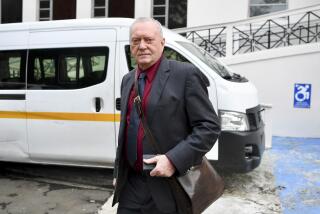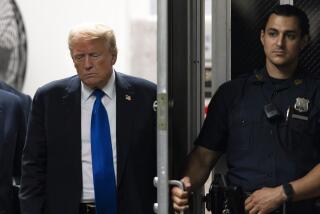Jury Puts Price Tag of $13.7 Million on Fraud
- Share via
A jury that convicted five former executives from Enron Corp. and Merrill Lynch & Co. of fraud and conspiracy last week decided Tuesday that the crime cost investors $13.7 million.
The five convictions on Nov. 3 followed a six-week criminal trial in Houston federal court, the first arising from the fraud that led to Enron’s collapse.
The jury of six men and six women also found that two Merrill subordinates played a larger role in the crime than former Merrill investment banking chief Daniel Bayly.
“In any of these group prosecutions, individual involvement varies along a spectrum,” said Beth Young, a senior research associate with the Corporate Library, which studies corporate governance issues.
Tuesday’s finding, coming after seven hours of deliberations, may be used by U.S. District Judge Ewing Werlein to increase or decrease the defendants’ prison terms. Sentencing is set for March. The jury acquitted a sixth defendant, former Enron accountant Sheila Kahanek.
The trial stemmed from Enron’s 1999 sale to Merrill of a $7-million stake in three energy-generating barges. The U.S. said that the deal was a disguised loan because Enron promised to pay Merrill back, and that the energy trader committed fraud when it booked the loan as a $12-million profit to meet earnings estimates.
Convicted of one count of conspiracy and two counts of wire fraud were Bayly, 57; former Enron finance executive Dan Boyle, 48; former Merrill strategic financial group chief James Brown, 52; former Merrill Managing Director Robert Furst, 43; and former Merrill Vice President William Fuhs, 36.
Brown was also convicted of two counts of making false statements, and Boyle was convicted of one count of making a false statement.
The jury on Tuesday also found that Brown and Furst played leadership roles, used sophisticated means and extensive planning in perpetrating the fraud. The jury said Bayly didn’t share similar responsibility in the crime.
Boyle and Fuhs waived their rights to have the jury rule on their sentencing factors.
The $13.7-million loss found by jurors may result in a 12-year sentence for each of the five defendants under U.S. sentencing guidelines. A prosecution witness said Enron investors lost as much as $43.8 million because of the fraud. A defense witness countered that the loss was as little as $120,000.
The jury also found that Bayly, Brown and Furst violated their employer’s trust. Brown was cleared of using a specialized skill or obstructing federal investigations in connection with his false-statement convictions.
Brown and Boyle face as many as 10 years in prison for the false-statement counts.
The sentencing phase of the trial was held because the U.S. Supreme Court is considering whether to overturn federal guidelines that allow judges to make sentencing determinations without jury assistance.
More to Read
Inside the business of entertainment
The Wide Shot brings you news, analysis and insights on everything from streaming wars to production — and what it all means for the future.
You may occasionally receive promotional content from the Los Angeles Times.










